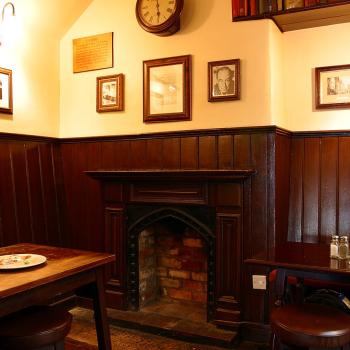
JR.R. Tolkien, in his letters, talks about the way one of his readers thought Frodo should have been treated as a traitor and sentenced to death:
Fair it would and did as far as Frodo considered alone was concerned. He ‘apostatized’ – and I have had one savage letter, crying out that he shd. have been executed as a traitor, not honoured.[1]
Tolkien understood that Frodo had failed. But he understood there was more to Frodo’s story than giving in to temptation. He had fought against it until he come to the limits of his strength, and it was only after he was broken down that he gave in. Through the story of Frodo, Tolkien showed how frail he understood humanity could be: people can be beaten down, broken down, manipulated, and pushed to their limit until, at last, they do the thing they thought they would never do. Good people can be made to do bad things, and, if we have not suffered as they have suffered, if we have not been tortured and pushed to the limit as they have been, we should avoid judging them, thinking we would do better in their shoes: “It seems sad and strange that, in this evil time when daily people of good will are tortured, ‘brainwashed’, and broken, anyone could be so fiercely simpleminded and selfrighteous.”[2] Indeed, when talking about the ultimate fate of anyone, he knew the kind of humility we should have: “But we who are all ‘in the same boat’ must not usurp the Judge”. [3] He applied this even to Gollum: “Into the ultimate judgment of Gollum I would not care to enquire.” [4]
Through his experiences with war, as well as seeing what he saw happening around the world during his life, Tolkien learned how evil could corrupt and destroys otherwise good people. Frodo was a good person, a hero, who was worthy of all the honor and respect he received, despite the fact that in the end, he gave into temptation. He pushed on to the end, using all his strength to resist evil, and that was all he could be expected to do: “Frodo deserved all honour because he spent every drop of his power of will and body, and that was just sufficient to bring him to the destined point, and no further.” [5]
It was not just the fact that Frodo had wrestled with, and fought valiantly, against the Ring for so long which allowed him to be a hero and receive a hero’s reward. It was also his good, indeed, merciful nature, one which he shared with Bilbo, which also allowed him to receive the mercy which he himself needed after he gave into his desire to claim the Ring for himself. Tolkien believed, following the teachings of Christ, that this was exactly the spirit which we need to have if we want to be saved. We need to show mercy and forgiveness to others if we want to receive mercy and forgiveness for ourselves:
But we are assumed that we must be ourselves extravagantly generous, if we are to hope for the extravagant generosity which the slightest easing of, or escape from, the consequences of our own follies and errors represents. And that mercy does sometimes occur in this life. [6]
Frodo fulfilled his duty, even if he also was overcome by the Ring, because he had first been merciful to Gollum. Indeed, it was not just his mercy, but all the mercy and pity which Gollum received throughout the years which allowed Gollum to be where he needed to be to take the Ring to its final doom. If at any time beforehand, pity had not been shown to him, it is likely that the quest to destroy the Ring would have ended in failure. Thus, Tolkien, seeing the pattern which developed in his writings, acknowledges that it was such pity and mercy which brought salvation to the world (as well as to those who fell into temptation themselves):
When Frodo says it was a pity that Bilbo did not kill Gollum, Gandalf quickly replies, ‘Pity? It was Pity that stayed his hand.’ (Notice how Tolkien himself capitalizes and personifies Pity). As the wizard further reflects upon the mercy shown to the creature, he muses that ‘the pity of Bilbo may rule the fate of many – yours not least’ (FR I/2), and in the long trajectory of the plot, the Ring is destroyed only because Gollum bites it from Frodo’s finger. If not for Bilbo’s pity, in show, Frodo’s quest would have failed. Tolkien reflected after publication that ‘the “salvation” of the world and Frodo’s own “salvation” is achieved by his previous pity and forgiveness of injury.’ [7]
Tolkien caught on to a major Christian element in his works. If we want to receive mercy, we must ourselves be merciful. Certainly, we should struggle against sin, but if and when we fail in our struggles and give in, we do not have to fear all is lost. God’s grace transcends our sins and is able to save us. Nonetheless, if we are to be saved, we must recognize in humility not only our failings, but human weakness in general so that we can then share the mercy we receive with others understanding their failings come from the same weakness which we have. We must recognize that as we falter and give in to our temptations, others, likewise, falter and give in to their own temptations; the temptations might differ, the pressure put on people to give in might differ, but everyone has a point in which, without grace, they will give in to sin. When Peter denied Christ three times, he had come to the limit of his own power to resist evil, but because he had a great, merciful and loving heart (which Christ brought out when he met with Peter after the resurrection), he was able to receive forgiveness. When Ossius of Cordova signed an Arian decree, it was only after extensive torture of himself and his loved ones; he had been taken to the limit and was broken down; nonetheless, with the greatness of his faith, hope and love, once he was set free, he was free to denounce what he had done and receive forgiveness (which is why St. Athanasius always considered Ossius with the highest of regards). Endo’s Silence also delves into this theme, with Christ himself affirming the forgiveness of those who were broken down by the powers that be in Japan.
Thus, Tolkien presents to us the picture of salvation which follows the Lord’s prayer. If we want mercy, if we want forgiveness, we must be merciful to others. We cannot judge them and their final fate. We can judge their actions, to be sure, but we cannot judge what lies behind their actions, knowing whether or not they were broken down and faltered through the stress of their lives, or if the followed through with evil without putting up a fight. Even if it is the latter, people still possess an element of the good within them, so that like Gollum, there is always hope for their salvation. We should hope for the salvation of all and act out in that hope with mercy and grace so that we then, can attain the salvation which desire for ourselves despite our own failings. If we deny such mercy to others, then we risk our own condemnation, as the Venerable Bede explains in his commentary on James:
For there will be judgment without mercy on him who has not acted mercifully. He will be judged without mercy who, when he was able to do so, did not act mercifully before he could be judged. Since this may be properly felt about all who are without mercy, it is clear in every way that the greater the mercy each one has obtained from the Lord, the more unjust he is in denying mercy to a neighbor needing it and the more justly he has paid the penalty for this wickedness . [8]
Frodo learned this lesson well, as the Scouring of the Shire shows. He was willing to show the mercy he received to Saruman, and in doing so, overcome evil with good, as Paul said Christians should do:
Beloved, never avenge yourselves, but leave it to the wrath of God; for it is written, “Vengeance is mine, I will repay, says the Lord.” No, “if your enemy is hungry, feed him; if he is thirsty, give him drink; for by so doing you will heap burning coals upon his head.” Do not be overcome by evil, but overcome evil with good. (Romans (RSV) 12:19-22 RSV).
Frodo’s mercy stung at Saruman, giving him the final victory:
Saruman turned to go, and Wormtongue shuffled after him. But even as Saruman passed close to Frodo a knife flashed in his hand, and he stabbed swiftly. The blade turned on the hidden mail-coat and snapped. A dozen hobbits, led by Sam, leaped forward with a cry and flung the villain to the ground. Sam drew his sword.
‘No, Sam!’ said Frodo. ‘Do not kill him even now. For he has not hurt me. And in any case I do not wish him to be slain in this evil mood. He was great once, of a noble kind that we should not dare to raise our hands against. He is fallen, and his cure is beyond us; but I would still spare him, in the hope that he may find it.’
Saruman rose to his feet, and stared at Frodo. There was a strange look in his eyes of mingled wonder and respect and hatred. ‘You have grown, Halfling,’ he said. ‘Yes, you have grown very much. You are wise, and cruel. You have robbed my revenge of sweetness, and now I must go hence in bitterness, in debt to your mercy. I hate it and you! Well, I go and I will trouble you no more. But do not expect me to wish you health and long life. You will have neither. But that is not my doing. I merely foretell.’[9]
It was Wormtongue, following the evil ways of his master, who would bring an end to Saruman, embracing a nihilistic hate, showing the end which evil brings upon all who embrace it. It knows no love, no mercy, no hope, no glory. It only knows gloom and the desire for destruction. To hold onto mercy, to embrace it, is to hold on to the whatever remnant of the good lies within us all, holding onto that which offers healing and rest. So long as we remain merciful to others, we can hope that such mercy will be met with greater mercy, one which will lead to our salvation: for when mercy meets mercy, it finds the heart willing to be saved.
[1] J.R.R. Tolkien, “Letter 181 to Michael Straight [drafts]” in The Letters of J.R.R. Tolkien. ed. Humphrey Carpenter (Boston: Houghton Mifflin Company, 1981), 234.
[2] J.R.R. Tolkien, “Letter 192 to Amy Ronald” in The Letters of J.R.R. Tolkien. ed. Humphrey Carpenter (Boston: Houghton Mifflin Company, 1981), 253.
[3] J.R.R. Tolkien, “Letter181 to Michael Straight,” 234.
[4] J.R.R. Tolkien, “Letter181 to Michael Straight,” 234. This is in part because Tolkien also understood that despite how corrupted Gollum was, there was always some good which remained. Gandalf, therefore, said that there was some hope, albeit little, for Gollum:
‘Only too true, I fear,’ said Gandalf. ‘But there was something else in it, I think, which you don’t see yet. Even Gollum was not wholly ruined. He had proved tougher than even one of the Wise would have guessed -as a hobbit might. There was a little corner of his mind that was still his own, and light came through it, as through a chink in the dark: light out of the past. It was actually pleasant, I think, to hear a kindly voice again, bringing up memories of wind, and trees, and sun on the grass, and such forgotten things.
‘But that, of course, would only make the evil part of him angrier in the end – unless it could be conquered. Unless it could be cured.’ Gandalf sighed. ‘Alas! there is little hope of that for him. Yet not no hope. No, not though he possessed the Ring so long, almost as far back as he can remember. For it was long since he had worn it much: in the black darkness it was seldom needed. Certainly he had never “faded”. He is thin and tough still. But the thing was eating up his mind, of course, and the torment had become almost unbearable. — [4] J.R.R. Tolkien, The Fellowship of the Ring in The Lord of the Rings: Collector’s Edition (Boston: Houghton Mifflin Company, 1966), 64.
[5] J.R.R. Tolkien, “Letter 192 to Amy Ronald” in The Letters of J.R.R. Tolkien. ed. Humphrey Carpenter (Boston: Houghton Mifflin Company, 1981), 253.
[6] J.R.R. Tolkien, “Letter 192 to Amy Ronald,” 253.
[7] John. M. Bowers, Tolkien’s Lost Chaucer (Oxford: Oxford University Press, 2019), 116.
[8] Venerable Bede, “Commentary on James” in Commentary on the Seven Catholic Epistles. Trans. Dom. David Hurst, OSB (Kalamazoo, MI: Cistercian Publications, 1985), 26-7.
[9] J.R.R. Tolkien, The Return of the King in The Lord of the Rings: Collector’s Edition (Boston: Houghton Mifflin Company, 1966), 299.
Stay in touch! Like A Little Bit of Nothing on Facebook.
If you liked what you read, please consider sharing it with your friends and family!











